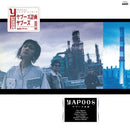Item Notes
Japanese 1LP Limited Edition
Release Date: 26/1/2022
Label: P-Vine Records
Description
Tracklisting
A1 バーバラ・セクサロイド 3:53
A2 キスを 4:02
A3 肉屋のように 3:57
A4 Daddy The Heaven 3:59
A5 ラヴ・クローン 4:03
B1 コレクター 4:32
B2 労働慰安唱歌 1:56
B3 ロリータ108号 4:12
B4 宇宙士官候補生 4:44
B5 素敵な時間 1:38
Refund Policy
All original product is sealed or brand new condition. However, if an item is defective (sealed and unused) Please send us proof of item and we will be happy to exchange the defective copy for a replacement of the same item within the first week after receiving the return item from you. If a replacement isn't available, we will offer you a store credit or refund (your choice). There will not be a shipping charge for this exchange.
For international returns, any customs or import duties, taxes and all other charges paid on return shipments are the solely your responsibility. In the event you refuse your package, only the purchase price will be refunded. All costs, duties, fees, or taxes are your responsibility and will not be refunded to you.
If items are not delivered because you gave us incorrect information, or because your post office was unable to deliver the package because there was no-one to receive it, We will refund you for the cost of the items only, but not for the postage charges. Provided the items are still available, we can re-send the items at your request one time only and you will have to pay all shipping fees.
Requests for refunds must be made within 30 days of the purchase date. We will not refund after such date for any reason whatsoever.
All items must be in original condition and show no signs of use, and must be returned in original vendor packaging.
We do not provide a refund or replacement for items that have been scanned as delivered by FedEx, Post Office or SF Express. If your package tracks as delivered, but you have not received it, please inquire with your local FedEx, mail carrier or at your local post office branch.
We cannot accept unwanted/incorrect items that have been opened.
Please make sure you pack your return securely. If an item is returned to us in an unsuitable condition due to poor packaging then we may have to send it back to you without a refund.


